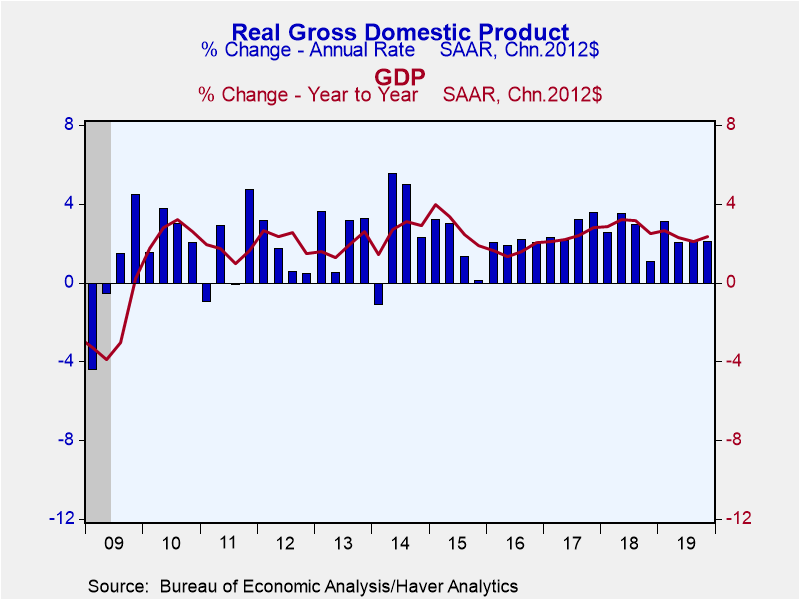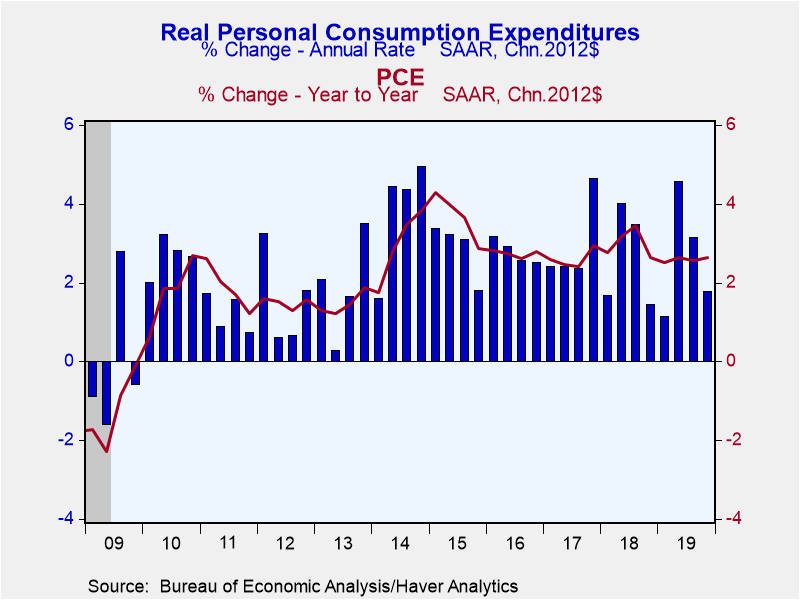 Global| Jan 30 2020
Global| Jan 30 2020U.S. GDP Growth Remains Moderate; Domestic Demand Weakens
by:Tom Moeller
|in:Economy in Brief
Summary
The U.S. economy grew 2.1% (SAAR) during the fourth quarter of 2019. That roughly equaled the growth during the prior two periods and left it at 2.3% for all of 2019. It was the weakest quarterly rate of growth since 2016 and met the [...]
The U.S. economy grew 2.1% (SAAR) during the fourth quarter of 2019. That roughly equaled the growth during the prior two periods and left it at 2.3% for all of 2019. It was the weakest quarterly rate of growth since 2016 and met the expected increase in the Action Economics Forecast Survey.
A weakening of growth in domestic final demand to 1.6% (2.3% y/y) held the economy back. It was the slowest rise since Q4'18 and was down from a 4.9% peak in Q4'17.
The GDP figures can be found in Haver's USECON and USNA database. USNA contains virtually all of the Bureau of Economic Analysis' detail in the national accounts. Both databases include tables of the newly published not seasonally adjusted data. The Action Economics consensus estimates can be found in AS1REPNA.
| Chained 2012 $ (%, AR) | Q4'19 | Q3'19 | Q2'19 | Q4'19 Y/Y | 2019 | 2018 | 2017 |
|---|---|---|---|---|---|---|---|
| Gross Domestic Product | 2.1 | 2.1 | 2.0 | 2.3 | 2.3 | 2.9 | 2.4 |
| Inventory Effect (%-point) | -1.1 | 0.0 | -0.9 | -0.4 | 0.1 | 0.1 | 0.1 |
| Final Sales | 3.2 | 2.1 | 3.0 | 2.7 | 2.2 | 2.8 | 2.3 |
| Foreign Trade Effect (%-point) | 1.5 | -0.1 | -0.7 | 0.4 | -0.1 | -0.2 | -0.2 |
| Domestic Final Sales | 1.6 | 2.2 | 3.6 | 2.3 | 2.3 | 3.0 | 2.5 |
| Personal Consumption Expenditure | 1.8 | 3.1 | 4.6 | 2.6 | 2.6 | 3.0 | 2.6 |
| Nonresidential Fixed Investment | -1.5 | -2.3 | -1.0 | -0.1 | 2.1 | 6.4 | 4.4 |
| Residential Investment | 5.8 | 4.6 | -2.9 | 1.5 | -1.5 | -1.5 | 3.5 |
| Government Spending | 2.7 | 1.7 | 4.8 | 3.0 | 2.3 | 1.7 | 0.7 |
| Chain-Type Price Index | |||||||
| GDP | 1.4 | 1.8 | 2.4 | 1.7 | 1.8 | 2.4 | 1.9 |
| Personal Consumption Expenditure | 1.6 | 1.5 | 2.4 | 1.5 | 1.4 | 2.1 | 1.8 |
| Less Food & Energy | 1.3 | 2.1 | 1.9 | 1.6 | 1.6 | 1.9 | 1.6 |
| Nonresidential Investment | -0.2 | 0.5 | 2.0 | 1.0 | 1.1 | 1.4 | 1.0 |
| Residential Investment | 2.7 | 3.4 | 1.7 | 2.6 | 2.9 | 5.6 | 4.5 |
Tom Moeller
AuthorMore in Author Profile »Prior to joining Haver Analytics in 2000, Mr. Moeller worked as the Economist at Chancellor Capital Management from 1985 to 1999. There, he developed comprehensive economic forecasts and interpreted economic data for equity and fixed income portfolio managers. Also at Chancellor, Mr. Moeller worked as an equity analyst and was responsible for researching and rating companies in the economically sensitive automobile and housing industries for investment in Chancellor’s equity portfolio. Prior to joining Chancellor, Mr. Moeller was an Economist at Citibank from 1979 to 1984. He also analyzed pricing behavior in the metals industry for the Council on Wage and Price Stability in Washington, D.C. In 1999, Mr. Moeller received the award for most accurate forecast from the Forecasters' Club of New York. From 1990 to 1992 he was President of the New York Association for Business Economists. Mr. Moeller earned an M.B.A. in Finance from Fordham University, where he graduated in 1987. He holds a Bachelor of Arts in Economics from George Washington University.
More Economy in Brief
 Global| Feb 05 2026
Global| Feb 05 2026Charts of the Week: Balanced Policy, Resilient Data and AI Narratives
by:Andrew Cates








